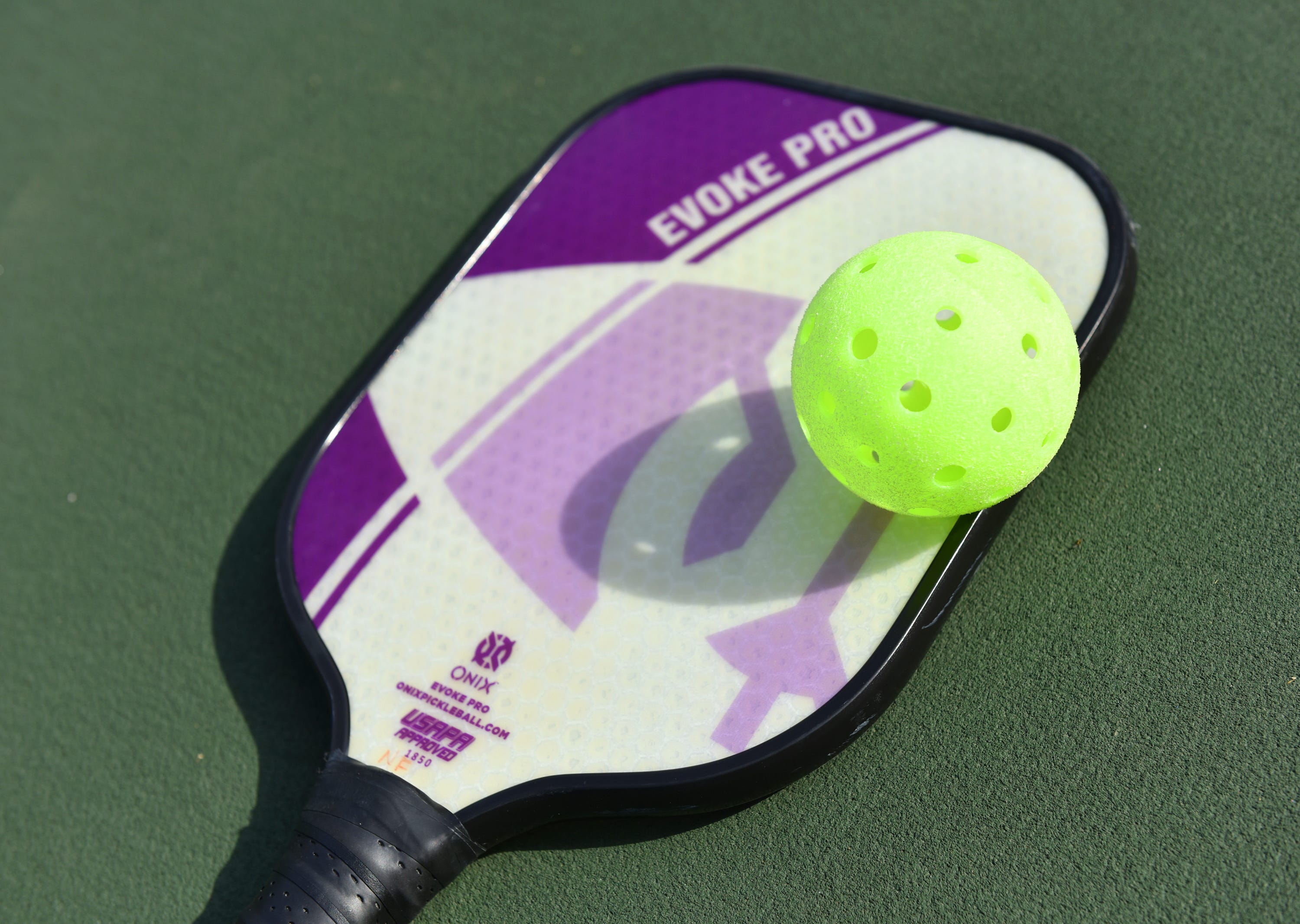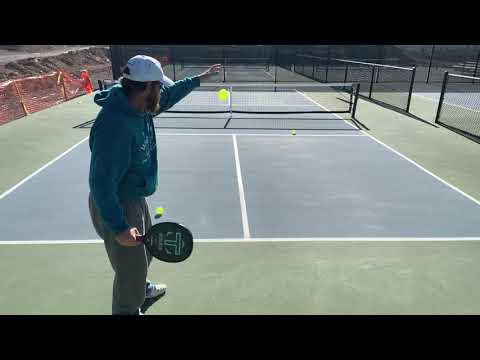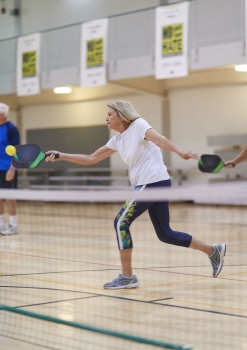
Pickleball is becoming more popular every year. Pickleball is a great activity for family and friends or alone. Even if you aren't an athlete, pickleball can be enjoyed by anyone.
You will need a paddle, tennis racquet and a ball to play. Pickleball paddles are easier to hit than regular tennis rackets. Pickleball balls are smaller than tennis balls and lighter. Pickleball is easier to learn for beginners. But, it's still hard to play. Here are some tips that will help you get started.
Pickleball involves fast-paced play and is a competitive game. If you're a beginner, you'll need to focus on the basics, like serving and rallying. Also, you need to keep your eyes on and ears on the ball. This will help you react quickly to force mistakes from your opponent. Practice your serve and spins. There are different strokes to choose from, so you'll need to figure out which ones are right for you.

One of the best ways to serve accurately is with an underhand serve. A underhand serve allows you to hit the ball without any part of your racquet touching your waist. Your opponent will have their hands full guessing where the ball is going to land. This will allow you to take some time to plan your strategy and help you decide how high you should raise the racquet.
If you're a bit more advanced you can mix up your shot selections. You can play overhead shots, or throw a spinning shot from your opponent's net. It is important to understand your opponent's strengths, weaknesses, and how you can mix your shots to counter them.
If you're ready to get serious about picking up the game, you'll want to check out a book. Gale Leach’s The Art of Pickleball should be read by everyone regardless of level. You will find tips and strategies that will help you improve the game.
The Pickleball Bible by Dr. Rick Lambson, an exercise scientist, and consultant for pickleball, is another book you should look for. You will also find annotated diagrams in the book to assist you with court maneuvering. You can also practice your shots with the digital edition.

At the Line Pickleball is another pickleball bible that Joe Baker (and Coach Mo) recommend. This book has an abridged version of the pickleball Bible, but with more information and a deeper focus on doubles strategy. It also contains quizzes that will test your knowledge. The book also includes a section where you can record your progress.
FAQ
Can I eat during my exercise?
Yes. Yes. Low-calorie snacks like watermelon and carrots, celery apples, bananas, grapes, celery, celery, celery, celery, celery, apple, bananas, and carrots are best. These foods are rich in nutrients that will help you work out better.
How many hours of sleep should you get each night?
The amount of sleep recommended depends on your age, gender, and personal needs. Adults need between 7 to 9 hours sleep each night. Children and teenagers need 10 to 12 hours of sleep per night. As they age, however, this number falls.
Why is it important that you get enough sleep?
To maintain a healthy lifestyle, it is important to get enough sleep. Sleep allows your body to repair itself and recover from daily stresses. Your ability to function optimally during the day is dependent on how much sleep you get each night.
How does caffeine affect my sleeping?
Caffeine affects how long it takes you to fall asleep and how soundly you sleep. Caffeine induces drowsiness which makes it easier to fall asleep. You may stay awake for longer periods, which makes it more difficult to fall asleep. If you drink coffee or energy drinks right before bedtime, try drinking them later in the evening instead.
Is it safe?
If possible, go outside. It's not just the air temperature that determines whether outdoor exercise is safe. Other factors include visibility, humidity, precipitation and wind speed. Layers of clothing are recommended to protect against wind chill and rain when exercising outdoors in inclement weather.
Do I gain weight from exercising?
Not at all. You can even maintain your weight by exercising. Regular exercise will help you build muscle and boost your metabolism. This will allow you to burn more calories every day. This means you won't store as much fat in your body.
What does exercise do for your body?
Exercise helps you lose weight and build muscle mass. It also increases energy levels, decreases stress, and improves sleep quality. You will experience improved moods and self-esteem as well as increased productivity and a lower risk of developing heart disease.
Statistics
- According to the Centers for Disease Control and Prevention, chronic diseases cause 7 out of 10 deaths in the U.S., and treating chronic diseases accounts for 86% of U.S. healthcare costs. (mana.md)
- One study showed that adults who watch more than 4 hours of television daily had an 80% higher risk of death from cardiovascular disease. (heart.org)
- Adolescent girls were less active than adolescent boys, with 85% vs. 78% not meeting WHO recommendations of at least 60 minutes of moderate to vigorous intensity physical activity per day. (who.int)
- Globally, 28% of adults aged 18 and over were not active enough in 2016 (men 23% and women 32%). (who.int)
External Links
How To
How to Burn Belly Fats Quicker
Belly Fat is usually seen as a problem when we want to lose weight. However, Belly Fat can be beneficial if you really think about it. It's the amount of fat stored around your stomach that protects your organs from getting damaged. Let's now see how to quickly lose belly fat.
Stress and inactivity are two of the major factors that cause us to store body fat. Because stress stimulates the release of cortisol hormone, it makes us hungry all the time. Cortisol increases insulin levels in our blood. The insulin then stores extra calories as fat. Lack of sleep causes the release of adrenaline into our system, leading to increased appetite. These extra calories can also be reduced by exercise
There are many ways to reduce belly fat. All of these methods can be used, depending on your budget. These are some great tips to help you lose belly fat fast.
-
Eat less food. You should eat smaller meals throughout the day than you would if you ate three big meals. This way, you'll consume fewer calories overall.
-
Get plenty of water. Water flushes out toxins from your body and keeps you hydrated. Water before each meal can help you feel fuller longer and reduce your appetite so that you don't overeat.
-
Avoid snack foods that are unhealthy. If you're looking for quick fixes, snack foods like chips, cookies, candies, etc. These tempting snacks might look appealing. But avoid these fattening treats as they contain lots of empty calories and too much sugar. Choose healthy options like whole grains, fruits, vegetables, nuts, seeds and nuts.
-
Do strength training exercises at least three times per week. Strength training helps build muscle mass, which means that you can burn more calories even when you are resting. It strengthens bones and muscles, ligaments, muscles, tendons, heart, lungs, as well as joints.
-
Move regularly and stretch. Stretching increases flexibility and mobility. It also reduces back pain. Walking is great for burning calories.
-
Reduce alcohol intake. Reduce alcohol intake. Alcohol is a waste of calories and has no nutritional value.
-
Reduce your weight gradually. To lose weight, the first step is to determine what your current weight. Add 5%-10% of your total bodyweight to calculate your ideal size. Once you have calculated your target weight, start reducing calorie consumption by 500-1000 calories daily until you reach your goal.
-
Avoid processed foods. These foods have high amounts of salt, sugar, and preservatives. While processed foods can be convenient, they don't offer enough nutrients to ensure your health.
-
Don't skip breakfast! Eating breakfast improves concentration, memory, and energy level. You should have protein (such as eggs) and fiber (such as oats) for breakfast.
-
Have regular bowel movements. Constipation or irregularity can lead to gas and bloating. This can be prevented by drinking plenty of water and increasing fiber intake.